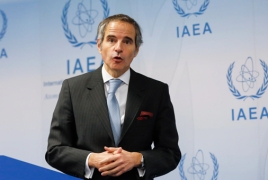
Iran retains the ability to quickly resume enriching uranium—potentially for weapons—in “a matter of months,” according to Rafael Grossi, head of the International Atomic Energy Agency. He reported that last weekend’s U.S. airstrikes on three Iranian sites inflicted serious but “not total” damage, directly challenging U.S. President Donald Trump’s assertion that Iran’s nuclear installations were “totally obliterated.”
“Frankly speaking, one cannot claim that everything has disappeared and there is nothing there,” Grossi said, according to BBC.
The attacks, conducted by Israel on June 13 and later joined by the U.S., targeted Iran’s nuclear facilities at Fordo, Natanz, and Isfahan. The full extent of the damage remains unclear.
Grossi said Tehran could have “in a matter of months… a few cascades of centrifuges spinning and producing enriched uranium.” He added that Iran still retains the “industrial and technological capacities… so if they so wish, they will be able to start doing this again.”
This is not the first indication that Iran’s nuclear infrastructure remains functional. A leaked preliminary Pentagon report this week suggested the strikes likely delayed the program by just months. Future intelligence might paint a different picture, revealing more extensive damage.
Trump responded angrily, insisting Iran’s sites were “completely destroyed” and accusing the media of attempting to “demean one of the most successful military strikes in history.”
A ceasefire has temporarily halted hostilities between Iran and Israel. However, Trump has stated he would “absolutely” consider bombing Iran again if intelligence indicates uranium enrichment at concerning levels.
Tehran’s military leadership remains skeptical of the ceasefire. Iranian armed forces chief Abdolrahim Mousavi said Sunday: “We did not start the war, but we have responded to the aggressor with all our power, and as we have serious doubts over the enemy's compliance with its commitments including the ceasefire, we are ready to respond with force” if attacked again.
Iran has offered conflicting damage assessments. Supreme Leader Ayatollah Ali Khamenei warned the strikes achieved nothing significant, while Foreign Minister Abbas Araghchi described the damage as “excessive and serious.”
Tensions with the IAEA have escalated. The Iranian parliament has moved to suspend cooperation with the agency, accusing it of aligning with Israel and the U.S. Tehran has rejected the IAEA’s request to inspect damaged sites. On Friday, Araghchi wrote on X that “Grossi's insistence on visiting the bombed sites under the pretext of safeguards is meaningless and possibly even malign in intent.”
Israel and the U.S. launched their assault following the IAEA’s finding last month that Iran violated its non-proliferation commitments for the first time in 20 years. Iran continues to assert that its nuclear efforts are peaceful and civilian in nature.
Despite Iran’s refusal to cooperate, Grossi expressed hope, stating, “I have to sit down with Iran and look into this, because at the end of the day, this whole thing, after the military strikes, will have to have a long-lasting solution, which cannot be but a diplomatic one.”

